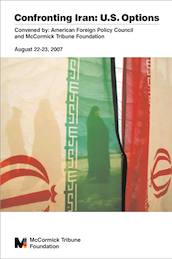Today, the Islamic Republic of Iran looms large on the agenda of policymakers in Washington. Over the past several years, it has become clear that the Islamic Republic is pursuing a massive, multifaceted endeavor to acquire a nuclear capability—and that it is making rapid progress toward this goal, despite pressure from the world community. Yet Iran’s nuclear program is just part of a larger picture. The Islamic Republic’s enduring support for terrorism, its growing and pernicious regional role, and its radical, uncompromising ideology currently also pose serious challenges to the United States, its allies and American interests in the greater Middle East.
So far, policymakers in Washington have failed to muster an adequate response on any of these fronts. As a result, the Islamic Republic has gained precious time to entrench itself in Iraq, expand its support for terrorists and bring added permanence to its nuclear effort. The logical conclusion of the current status quo is a mature Iranian nuclear capability, continued Coalition casualties in Iraq, and emboldened terrorist groups across the region. If it hopes to avoid such an outcome, the United States must harness all the elements of national power into a strategy that focuses on three concrete goals vis-à-vis Iran: counterproliferation, counterterrorism, and counterinsurgency.
Read the full report, in PDF form, by clicking the link below.

